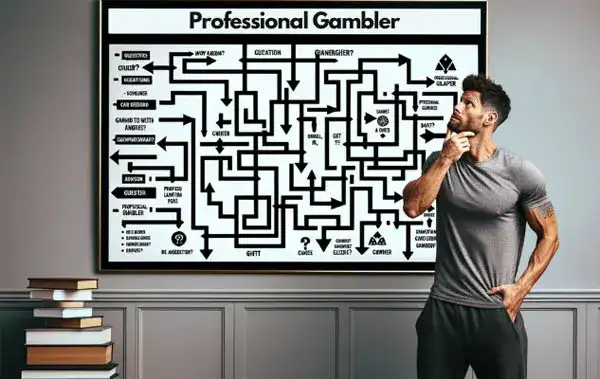If you're the adventurous type, always on the lookout for a bit of a thrill, chances are you've dabbled in online casinos. And they are continuously growing their popularity thanks to how easy they make it to enjoy a bit of gambling from the comfort of your couch.
This is a global problem. Gambling whilst under the age of 18 is a criminal offense, but there's no way of checking. When a website simply asks, "Are you over 18?" without any further verification, it's essentially shifting the responsibility onto the user. It's more of a formality than a genuine effort to verify age, leaving the door open for anyone to click "Yes" regardless of their actual age.
Along with this, many scam sites are out there too. Even if you're very sensible, looking to have a fun in moderation, you still need to be aware of deceptive sites. Make sure that you do know what you’re getting yourself into before you actually start gambling through an online casino. Of course, legitimate casinos are out there, the legitimacy of which is measured by RTP (Return To Player: payout percentage).
Gambling is NOT the way to make money. It is a way to spend money to enjoy a good time.
Did You Know?
- Global Prevalence: It's estimated that about 1-3% of the adult population worldwide suffers from a gambling disorder.
- Youth Gambling: In the US, around 60-80% of high school students report having gambled for money in the past year.
- Pathological Gamblers: Up to 1% of the adult population in the United States could be considered pathological gamblers.
- Online Gambling Growth: The global online gambling market size is expected to reach USD 127.3 billion by 2027, increasing access and potential addiction risks.
- Debt Levels: The average debt generated by a male gambling addict is between $55,000 and $90,000; for women, it's about $15,000.
- Suicide Rates: Gambling addicts are 15 times more likely to commit suicide than the general population.
- Comorbidity: Around 38% of problem gamblers also suffer from a mood disorder, such as depression or bipolar disorder.
Online Casinos: A Gamble, Not a Job
Casino sites are businesses, so of course, they continuously offer promotional deals. They say they let you make more money than other sites. They give you the first attempts for free. A free voucher for so-and-so. A limited-time something.
But let's clear something up. You are paying them money, right? It's a game, not an investment. Playing at an online casino is a gamble, not a reliable way to earn a living. Sure, the idea of winning big with just a few clicks is exciting, but it's not as straightforward as it seems.
The Reality of Losing It All
First up, winning money at an online casino isn't guaranteed. For every big win story, there are countless others where people haven't won anything. In fact, the odds are designed to favor the house. This means that over time, the casino is more likely to win than you are. The games are fun, no doubt. They're designed to be entertaining, with flashy graphics and exciting sounds. But they're not a reliable source of income.
Think about it like buying a lottery ticket. It's a bit of fun, and there's a chance you might win something, but you wouldn't want to rely on it to pay the bills, right?
Did You Know?
- Employment Issues: Problem gamblers are more likely to be unemployed than the general population, with rates around 23.2%.
- Relapse Rates: The relapse rate for individuals suffering from gambling addiction is estimated to be between 50% to 75%.
- Treatment Seeking: Only about 10% of those suffering from gambling addiction seek treatment.
- Crime Rates: Approximately 50% of those with gambling problems commit crimes to support their gambling activities.
- Family Impact: Over 90% of pathological gamblers report their gambling addiction had a negative impact on their family relationships.
- Bankruptcy: Problem gamblers are more likely to file for bankruptcy than non-gamblers, with rates as high as 20%.
- Substance Abuse: Up to 75% of problem gamblers may have an alcohol disorder, and 38% might have a drug problem.
The Persuasion Tactics
So, why do casino sites and their affiliates work so hard to persuade you to join? Well, it's simple. The more people play, the more money the casino sites potentially make. That's why you'll see those tempting offers and hear stories about people winning big. It's all part of the allure to get you to play more.
But here's the thing. While the chance to win more money than you put in is real, it's not the norm. Most players will experience losses over time. You'd better approach online gambling with this mindset. Enjoy it modestly for the entertainment, not as a money-making scheme.
The Addiction
It may all start out as a fun activity or a rare treat, but for some, it turns into something they can't control. It becomes a need that has to be met, no matter the cost. People might not even realize they're heading down that path until they're already there.
Knowing the signs of gambling addiction can really make a difference. Here are a few red flags:
- Finding it hard to stop or control betting
- Gambling even when you don't have the money for it
- Friends or family expressing concern over how much you gamble
- Losing interest in other hobbies because of gambling
- Lying about how much time or money you're spending on gambling
Seeing these signs in yourself or someone else can be a wake-up call. It's a nudge to take a step back and think about what's happening.
Did You Know?
- Mental Health: Around 34% of those with a gambling problem also suffer from major depression.
- Youth Risk: Adolescents are two to four times more likely to develop a gambling problem than adults.
- Gender Differences: Men are more likely to develop a gambling problem than women, but women who gamble tend to become addicted more quickly.
- Internet Gambling: Problem gambling rates among Internet gamblers are three times higher than non-Internet gamblers.
- Impact on Productivity: Employees with gambling problems are more likely to report job loss, absenteeism, and decreased productivity.
- COVID-19 Impact: The COVID-19 pandemic has led to increased online gambling activities, with some countries reporting a 50% increase in online gambling transactions.
Why It's a Big Deal
You see, gambling addiction can mess with almost every area of your life. Relationships can suffer, jobs can be lost, and mental health can take a hit. It's a lot, isn't it? The stress of hiding debts or chasing losses can lead to anxiety and depression. And it doesn't just affect the person gambling; it can ripple out to touch everyone around them.
Finding a Way Out
If you or someone you know is struggling with gambling addiction, the first step is recognizing that it's okay to ask for help. It's a tough journey, but support can make a big difference. Here are a few steps to consider:
- Talking to a professional who understands gambling addiction
- Joining a support group where you can share experiences and strategies
- Setting clear limits on gambling, or stopping altogether
- Finding new activities to fill the gap left by gambling
It's not an easy fix, and there will be good days and bad days. But taking it one step at a time can lead to a healthier, happier life without gambling taking the wheel.
Gambling addiction is a serious challenge, but it's one that can be managed with the right support and strategies. Recognizing the problem is the first step, followed by reaching out for help and finding healthier ways to cope and fill your time. Remember, it's a process, and it's okay to take it one day at a time.
The Impact of Being a Casino Affiliate
Do you think becoming a casino affiliate may be an easy way to make extra cash? Just promoting gambling sites and getting a cut? Well, you'd better think about the bigger picture. As a casino affiliate, you'll be part of a chain that can lead to some serious consequences for people.
Young people can stumble across your promotions, get intrigued, and before they know it, they're in over their heads. It's a big responsibility, isn't it? Here's the thing:
- I already told you that gambling addiction is a real issue.
- Your promotions could be the first step for someone on the path to addiction.
- So you help them create problems, not just for themselves but that can affect their entire families.
The Ethical Side of Things
Sure, being a casino affiliate is legal, and it's a legitimate way to earn income. But just because you can, does that mean you should? There's a huge ethical question mark hanging over the whole affair. You're basically earning money from other people's potential misfortune. That's a tough pill to swallow when you think about it, isn't it?
- Promoting gambling comes with ethical considerations.
- It's worth thinking about the source of your income and its impact on others.
What You're Really Promoting
At the end of the day, you're telling your followers, readers, or viewers that these casinos are worth their time and money. But are they? Really?
- Every promotion is an endorsement of gambling.
- The reality of gambling losses and addiction can't be ignored.
A Different Path
So, where does this leave you? If the idea of potentially contributing to someone's gambling problem doesn't sit right with you, there are plenty of other ways to make money online. Affiliate marketing doesn't have to be off the table. There's a whole world of options out there that don't involve gambling. Why not explore those instead?
- Consider ethical alternatives to casino affiliate marketing.
- There are many ways to earn online without promoting gambling.
Choosing to promote online casinos is a decision that comes with its own set of moral and ethical considerations. It's worth taking a step back to consider the potential impact on others. After all, the choices we make about how we earn our money can say a lot about us, don't you think?





I agree with you completely. My uncle was referring online casino to hundreds of others and made good money, then spent it all gambling himself. He was an addict after all. Once you put your foot in it it's hard to get out.
Thank you for sharing, Carson.